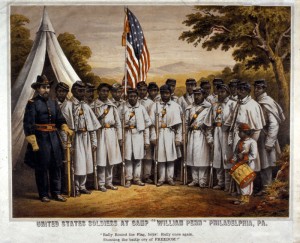As discussed in class today, the Civil War–and the role played in it by black Southerners–has recently been the subject of controversy in the national media, thanks to revelations about a faulty claim in a textbook distributed to fourth-graders in Virginia.
If that article proved one thing, it was that you can’t simply cite as fact everything you read on the Internet–perhaps especially when it’s about the Civil War. But this episode put a national spotlight on the ongoing efforts of Confederate heritage groups like the Sons of Confederate Veterans to argue that thousands of African Americans fought as soldiers for the Confederate army during the Civil War. Academic historians unanimously dispute this claim because it is not supported by documentary evidence, but the claims persist on the Internet and Confederate heritage groups continue to point to historical figures like Weary Clyburn–the man mentioned in the Looking for Lincoln excerpt we watched in class–as proof for broader claims about “black Confederates.” Yet the claims made about Clyburn by Earl Ijames, the historian pictured in that documentary, do not rest on solid evidence. And two historians have even discovered how several Confederate heritage websites falsified the image below to make it look like a picture of black Confederates. You can read about their discovery on the webpage Retouching History.

The authors of the website Retouching History discuss modern falsifications of this image of U.S. Colored Troops.
Later this semester we will talk in greater detail about the reasons why historians dispute the idea of thousands of “black Confederates,” and we’ll read a book by Bruce Levine that deals with the subject. But for now, I’d like you to think about this question: why do some groups like the SCV defend the “black Confederate” thesis so vehemently?
You may have your own speculations about what motivates claims about “black Confederates,” but throughout this semester, you need to be prepared to always defend your claims with evidence. To answer the question of why there are defenders of the “black Confederate” thesis, we need to look closely at what other arguments and hypotheses about the Civil War this idea is typically tied to or advanced with. Only then can we come to some evidence-based conclusions about why finding (or inventing) evidence of black Confederate soldiers matters so much to a small but vocal group of Americans.
Here is your assignment for Blog Post #1. First, read the following articles or blog posts, and be sure to also read through the comments left on them by readers.
- Kevin Levin, “Earl Ijames’s ‘Colored Confederates,'” Civil War Memory blog, May 11, 2009 (scroll through some of the comments too)
- Kevin Levin, “Looking for Silas Chandler,” Civil War Memory blog, March 28, 2010
- “Virginia 4th-grade textbook criticized over claims on black Confederate soldiers,” Washington Post, October 20, 2010 (and comments here)
- “Melvyn Patrick Ely Debates SCV on Fox,” Civil War Memory blog, November 7, 2010 (watch the video)
Then, leave a comment here responding to these questions: What other arguments to defenders of the “black Confederate” thesis make about the Civil War era or the history that has been written about it? Do these other arguments shed any light on the question of why Confederate heritage groups are interested in finding supposed “black Confederates” like Weary Clyburn and Silas Chandler?
Back up your answer to these questions by citing specific quotations, comments, or statements that led you to your conclusion, being sure to say where you found these comments. If another student has already left a comment making the point you wanted to make it, you can still add something new by providing additional supporting evidence in support of it.


